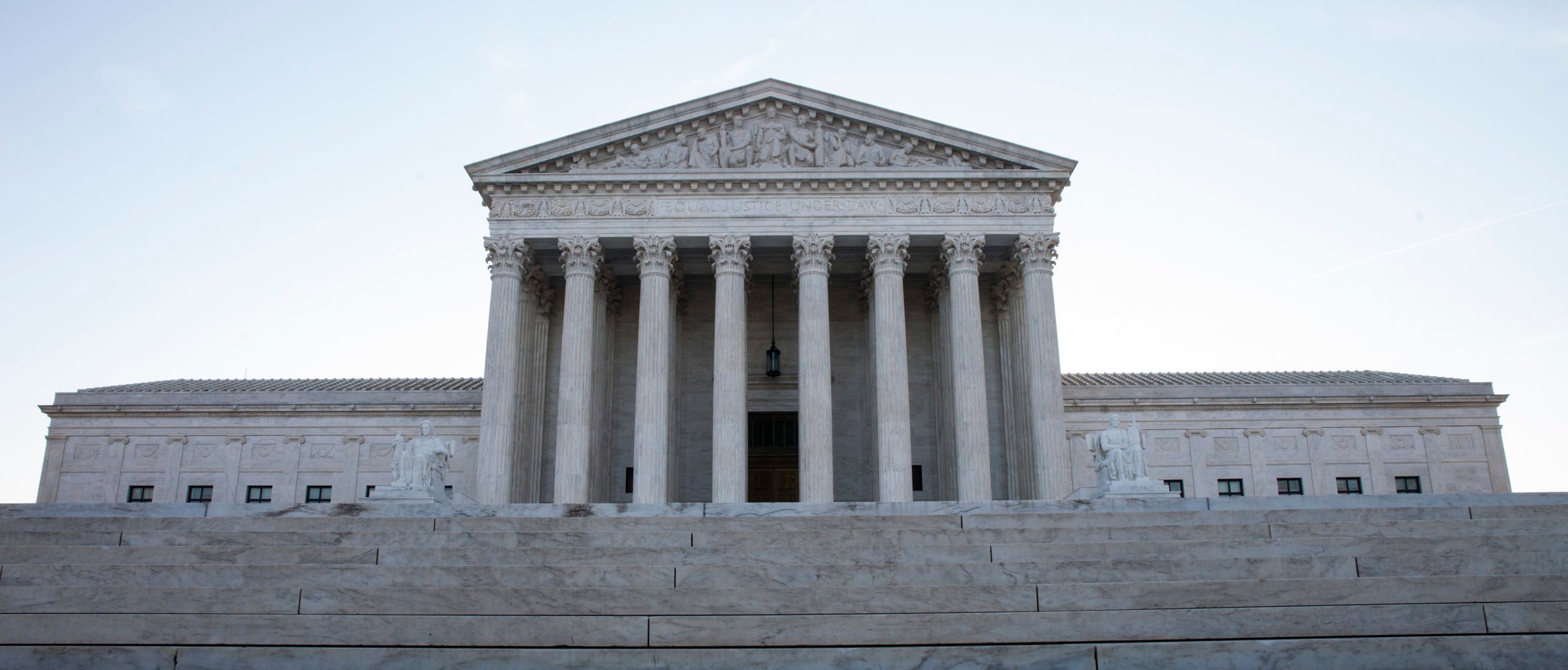- The Supreme Court heard oral arguments Wednesday for Vidal v. Elster, a case considering whether the United States Patent & Trademark Office’s (USPTO) denial of a trademark for the phrase “Trump too small” violates the First Amendment by limiting criticism of public figures.
- The justices seemed skeptical there was a First Amendment violation, citing history and prior cases that support the law USPTO relied on in its decision, which restricts the registration of trademarks using names.
- “At the end of the day, it’s pretty hard to argue that a tradition that’s been around a long, long time, since the founding, common law type stuff, is inconsistent with the First Amendment,” Justice Neil Gorsuch said.
The Supreme Court seemed unconvinced Wednesday that denying trademark protection for T-shirts with the phrase “Trump too small” violates the First Amendment.
The justices peppered the lawyer defending t-shirt maker Steve Elster with skeptical questions during oral arguments in Vidal v. Elster, gravitating toward the government’s argument that trademark protections do not restrict speech, but rather are a government benefit conferring a commercial advantage. The phrase, which the United States Patent & Trademark Office (USPTO) denied Elster protection for under a trademark law restricting the registration of names, is a reference to Republican Florida Sen. Marco Rubio’s crude joke about Trump’s “small hands” during a 2016 presidential debate.
“You know what they say about guys with small hands,” Rubio told the crowd at the time. Elster’s registration request stated that he wanted to express “that some features of President Trump and his policies are diminutive,” according to court documents.
Justice Neil Gorsuch suggested that history, alone, undermines the foundation of First Amendment arguments raised by Jonathan Taylor, the attorney defending Elster, pointing to a long record of other content-based restrictions like geography.
“At the end of the day, it’s pretty hard to argue that a tradition that’s been around a long, long time, since the founding, common law type stuff, is inconsistent with the First Amendment,” Gorsuch said.
Justice Elena Kagan pushed Taylor to name a single Supreme Court case where a viewpoint-neutral restriction on the provision of a government benefit was deemed a First Amendment violation.
“But what you can’t find is a case that supports your proposition,” she said. (RELATED: ‘The New Town Square’: Supreme Court Questions Whether Gov’t Officials Can Block Constituents On Social Media)
Section 2(c) of the Lanham Act prevents the registration of trademarks that include “a name, portrait, or signature identifying a particular living individual” without the person’s written consent. The U.S. Court of Appeals for the Federal Circuit found in February 2022 that the USPTO’s decision to deny the trademark based on the act “unconstitutionally restricts free speech in violation of the First Amendment” by limiting criticism of public figures, a decision the Biden administration appealed to the Supreme Court.
Justice Clarence Thomas raised a point brought up by Deputy Solicitor General Malcolm Stewart, who argued on behalf of the government, that Elster remained free to sell T-shirts and other products containing the phrase, even without a trademark.
“What speech, precisely, is being burdened?” he asked Taylor.
WASHINGTON, D.C. – MARCH 20: Morning light shines outside The United States Supreme Court building on March 20, 2017 in Washington, D.C. The Senate will hold a confirmation hearing for Supreme Court Nominee Neil Gorsuch. (Photo by Zach Gibson/Getty Images)
Of the nine justices, Justice Samuel Alito seemed most sympathetic with the First Amendment claims, spelling out exactly where he stands: he won’t side with the government on the theory that the restriction is a condition attached to a government benefit.
“I mean, you don’t need my vote to win your case,” he told Stewart. “I’m trying to see if you have any argument … maybe you’ve just decided, well, Alito is a lost cause here.”
In his final appeal to the justices, Stewart posed another hypothetical — a New York car dealer who tries to register the trademark “the Derek Jeter of car dealers” and says he performs “with the same excellence and professionalism that New Yorkers have come to associate” with Miami Marlins CEO Derek Jeter.
“He could worry, if this person can call himself the Derek Jeter of car dealers, next there will be the ‘Derek Jeter’ of orthodontists’ and the ‘Derek Jeter of barbers,” Stewart said. “And the value of his name will be reduced, will be diluted.”
All content created by the Daily Caller News Foundation, an independent and nonpartisan newswire service, is available without charge to any legitimate news publisher that can provide a large audience. All republished articles must include our logo, our reporter’s byline and their DCNF affiliation. For any questions about our guidelines or partnering with us, please contact [email protected].

